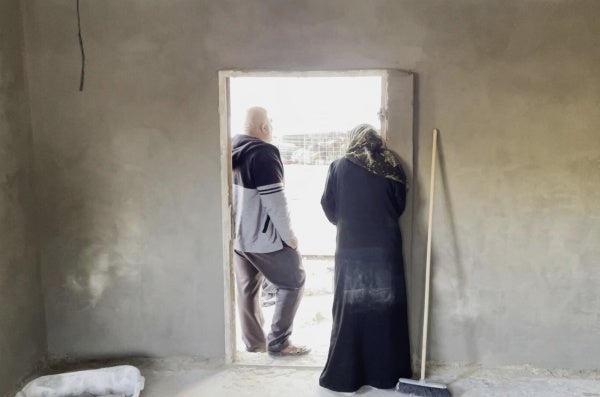Lire la version en français / Hier die deutsche Ausgabe lesen
There were ten or twelve of them, all in civilian clothes. They were armed with knives, handguns, and assault rifles. They came to the small, rural community of about 40 people and started piling up stones in the road, blocking the only way out.
On the third day, dozens more arrived, all armed. Some went into the fields with dogs to steal hundreds of sheep. Some went door to door, telling people to leave their homes within the hour, or else…
They threatened to “cut our throats, and pointed at us, including our kids,” one victim later described. “I told my wife to take the kids and run.”
Residents fled for their lives. None have been able to return to their homes in al-Qanub, near Hebron in the southern West Bank.
These kinds of Israeli settler attacks on Palestinians in the West Bank have been increasing since October.
Over the past six months, most international eyes have been focused on the horrific events in and around Gaza. That’s understandable, given the unprecedentedly gruesome Hamas-led attacks on October 7 and the Israeli military’s half year of massive collective punishment of the Palestinian people in Gaza in response.
But the worsening situation in the West Bank is worthy of the world’s attention too. Israeli settlers have assaulted, tortured, and committed sexual violence against Palestinians. They’ve stolen their phones, cars, and livestock; threatened to kill them if they did not leave permanently; and destroyed their homes and schools.
Israeli security forces should be stopping this violence and reining in the settlers. They are not.
Israeli police, which have law-enforcement jurisdiction over settlers, have reportedly been instructed not to enforce the law against violent settlers. The military, which has jurisdiction over Palestinians in the occupied West Bank, are either standing by or actively taking part in the attacks.
Of the more than 700 settler attacks the UN has recorded between October 7 and April 3, soldiers in uniform have been present in nearly half of them.
Authorities in Israel are ultimately responsible for this rising settler violence against Palestinian communities. It’s on them to maintain security, to protect human life and property, and they are clearly failing to do so. What’s more, authorities have done nothing to help people return safely to their homes.
The international community – especially Israel’s friends – has tools available to try to rein in this campaign of violence.
The UK, US, and France have announced visa policies that bar entry to some violent settlers. The US and UK have also imposed financial sanctions on eight settlers and two settlement outposts. The EU has yet to impose sanctions, due to staunch reluctance by EU members Hungary and the Czech Republic.
But what about outside pressure on the Israeli government itself, given its ultimate responsibility here? Governments could suspend military support to Israel. They could review or suspend bilateral agreements. They could boost efforts to hold war crimes suspects to account.
That’s the kind of outside pressure that would probably be more likely to stem settler attacks.





